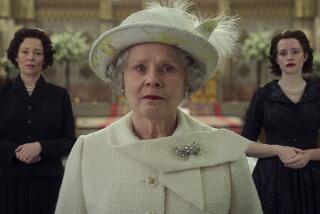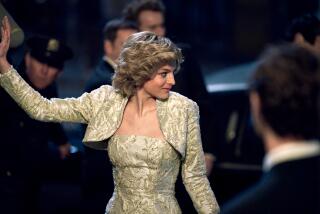Britain’s Stiff Upper Lip Crumples as Loss Sinks In
- Share via
LONDON — Carl Davies brought memories, a message--and painkillers--to make his mark on British history. Doreen King came with a single red rose and a poem. Linda McAdam brought two preschoolers and tears she couldn’t staunch.
Across Britain, along country lanes and in the palace where her body lies guarded by a single redcoat in a bearskin hat, an astonishing national lament swelled Tuesday for Diana, princess of Wales.
Even the British themselves seemed surprised to discover the depth and the scope of their emotions. The character-defining stiff upper lip seemed suddenly as dated as empire.
At Kensington Palace, where Diana lived, more than 100,000 people came Tuesday, adding to an ocean of blossoms that spilled along nearby pathways.
At St. James’ Palace, the number of condolence books overseen by ushers in top hats was increased from four to 15. The palace is open round the clock; no matter.
Julian McLean joined the line at 1:30 a.m. Tuesday and walked into the Long Corridor at the palace to sign his name at 7 a.m. “It was very cold and very subdued throughout the night. I did it because I will never get a chance to do this again,” McLean said.
Nonplused planners now believe that up to 2 million people will jam into the restricted area of London through which Diana’s coffin will be carried to Westminster Abbey for her funeral at 11 a.m. Saturday local time. After the service, her casket will be driven under escort to her family’s home about 80 miles northwest of London.
Most shops, restaurants and museums will be closed Saturday, and the country will officially observe a minute of silence when the service ends about 11:45.
Queen Elizabeth II and her family, including Diana’s sons, Prince William, 15, and Prince Harry, 12, will travel to London for the funeral from their vacation home at Balmoral Castle in the Scottish Highlands, where they have remained in seclusion.
On Tuesday, Buckingham Palace announced that a foundation will be established to accept gifts in Diana’s honor and distribute them among charities that she supported.
Until the funeral, Diana’s body will continue to lie in a flag-draped coffin before the altar in the Chapel Royal at the turreted palace that was the London home of Britain’s rulers until they moved to Buckingham Palace.
In the low, stone St. James’ Palace, built in the 16th century by Henry VIII, the long wait ends for mourners when they are ushered through a side door and into a solemn and still room where blank-paged notebooks sit on tables covered by black cloths.
Mourners may write as much as they like. They stay as long as they need to in the long room. Eventually, the books will go to Buckingham Palace, and then for preservation in national archives.
“I wouldn’t even tell him what I wrote to Di,” said Eurostar steward Karen Willett, nudging her boyfriend, Alan Wyatt, who also works for the company that runs trains under the English Channel.
Willett said she had been haunted by Diana’s death since learning of it Sunday morning in France. “Coming back on the train was the eeriest experience. We are supposed to be all smiley to people, but we couldn’t do it that day. It didn’t seem to matter, though, because on that train there was silence from Paris all the way home.”
Wyatt said he will never forget that ride, or Diana. “She was so much more human than all the rest of the royals. Every single person on the planet knew her. That’s why I’m here. Four hours didn’t seem long to wait at all.”
Shirley Scott came to London for the day from Cambridge and stood in the sunshine for 3 1/2 hours preparing what she would write. Said Scott: “ ‘You were a princess of modern times.’ That’s what I wrote.”
After about two hours in line, with as much time still to endure, Carl Davies, 62, leaned heavily on a sturdy wooden cane. His arthritis was killing him, but it was a familiar devil and he had pills.
It was memory that impelled him uncomfortably out into the crowd, said Davies, a memory from the ‘80s when Diana was newly married and he was director of a psychiatric hospital in Epsom.
“I shook her hand and she was charming, but it was the patients she was most concerned with. That’s what struck me,” Davies remembered. “She was wearing green that day, and there was a woman in a wheelchair who said to her, ‘That’s my favorite color,’ and Diana replied, bending down to speak at the level of the woman, ‘I wore it just for you.’ And when a patient admired her bouquet, she plucked a flower from it and gave it to her. Some of the patients had never known such joy and comfort.”
At last reaching a book of condolence, Davies wrote, “You will always be ‘Her Royal Highness’ to me.” Diana officially lost that title when she divorced Prince Charles last year.
Biochemist Doreen King carried a single red rose and inscribed in the palace book a poem she had carefully typed out before leaving home in Essex:
DIANA
Oh Princess Diana
Now we have lost you.
You shone like the sun
In establishment’s power.
In our hearts we still see you
In the Twentieth century--
The People’s Queen--you’ll still be.
“She did so much good work. She stood for us, not just in Britain but in all the world,” said King.
Ashoka Wijesinghe, a Sri Lankan resident of London, brought white carnations and her two daughters on their last day of summer vacation from grade school.
“I am a Buddhist, so I believe in reincarnation. I know that Diana will return as a princess who again helps children. Being here is the only way I can console myself. My children don’t believe she is gone--they still see her on TV. She is so full of life,” Wijesinghe said.
After waiting 4 1/2 hours, Grainne O’Shea, a 32-year-old midwife from Birmingham, had polished her thoughts.
“I wrote a whole page; you’re probably not supposed to do that. I felt I had to show her that I was here. ‘See you in another life,’ I wrote. And I wrote, ‘You brought the royal family out of the cold and into the 20th century.’
“These books are important,” O’Shea continued. “They will go to her family. They are for history. I came today because I will be working back in Birmingham on Saturday. I hope that while the funeral is going on I’m delivering a baby. New life.”
More to Read
Sign up for Essential California
The most important California stories and recommendations in your inbox every morning.
You may occasionally receive promotional content from the Los Angeles Times.













